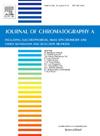利用荧光检测减少毛细管电泳中重水的水淬过程。
IF 3.8
2区 化学
Q1 BIOCHEMICAL RESEARCH METHODS
引用次数: 0
摘要
水在分析方法中无处不在,因其荧光淬灭特性而闻名,影响着荧光分光光度法等技术或荧光检测技术。本研究探讨了水(H₂O)取代重水(D₂O)对蒽醌类和蒽环类化合物荧光行为的影响。蒽醌类和蒽环类化合物在药学中发挥着重要作用,是各种治疗配方,特别是癌症治疗和其他药物干预中的重要成分。以重水为背景电解质(BGE)溶剂的毛细管电泳(CE)为这些分析物的分离和检测提供了卓越的灵敏度。实验结果表明,在以重水为基础的缓冲液中,选定的蒽醌类化合物瑞香素(RH)、芦荟大黄素(AE)以及蒽环类化合物多柔比星(DOX)、表柔比星(EPI)和达乌诺比星(DAU)的检测限和分离效率都得到了提高,这凸显了重水在推进分析化学方面的潜力。本文章由计算机程序翻译,如有差异,请以英文原文为准。
Reducing the water quenching processes using heavy water in capillary electrophoresis with fluorescence detection
Water, ubiquitous in analytical methods, is renowned for its fluorescence quenching properties, influencing techniques like fluorescence spectrophotometry or techniques with fluorescence detection. This study explores the impact of water (H₂O) substitution for heavy water (D₂O) on the fluorescence behavior of anthraquinones and anthracyclines. Anthraquinones and anthracyclines play crucial roles in pharmacy, serving as essential components in various therapeutic formulations, particularly in cancer treatment and other pharmacological interventions. Capillary electrophoresis (CE) with heavy water as the background electrolyte (BGE) solvent offers superior sensitivity to the separation and detection of these analytes. Experimental results demonstrate the improved detection limits and separation efficiency of selected anthraquinones rhein (RH), aloe-emodin (AE), and anthracyclines doxorubicin (DOX), epirubicin (EPI) and daunorubicine (DAU) in heavy water-based buffers, highlighting the potential of heavy water in advancing analytical chemistry.
求助全文
通过发布文献求助,成功后即可免费获取论文全文。
去求助
来源期刊

Journal of Chromatography A
化学-分析化学
CiteScore
7.90
自引率
14.60%
发文量
742
审稿时长
45 days
期刊介绍:
The Journal of Chromatography A provides a forum for the publication of original research and critical reviews on all aspects of fundamental and applied separation science. The scope of the journal includes chromatography and related techniques, electromigration techniques (e.g. electrophoresis, electrochromatography), hyphenated and other multi-dimensional techniques, sample preparation, and detection methods such as mass spectrometry. Contributions consist mainly of research papers dealing with the theory of separation methods, instrumental developments and analytical and preparative applications of general interest.
 求助内容:
求助内容: 应助结果提醒方式:
应助结果提醒方式:


